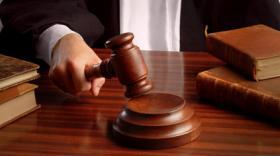With five weeks to go before Election Day, candidates for the state’s highest court are trying to get some attention. And they’re spending more time raising campaign funds because the legislature eliminated state funding for judicial races last year.
Campaign ads for the Supreme Court are usually pretty civil. They're kind of like one from Justice Bob Hunter, in which a narrator says: "In the North Carolina Legal system, one quality must stand out: Fairness." In the video, three young people hold a sign that says "fairness" and a then flip it over to say, "Bob Hunter!"
And when candidates themselves interact, they're generally diplomatic, too. In a recent forum hosted by the Federalist Society association of attorneys with Supreme Court candidates, a moderator asked Hunter Hunter what distinguished him from his opponent Sam Ervin, IV.
Hunter answered that he was more experienced and older than Ervin, and Ervin responded in jest: "Well, I plead guilty to being younger." The room responded with laughter.
And even if they get pressed, they avoid attacking. Hunter said: "We just have different experiences and we're both pretty well equally qualified."
In these races, it's difficult for most voters to tell candidates apart.
In 2012, 4.5 million people in North Carolina voted for president and 1 million of those left the box for a state Supreme Court seat blank.
There are four open seats and eight candidates running for the highest court in North Carolina this year.
Their code of ethics keeps them from talking about specific cases they've heard or *might* hear, so they campaign largely on their resumes, which are often similar: Decades of private law practice and some years in a trial or appellate court.
And that doesn’t seem to generate excitement among voters. In 2012, 4.5 million people in North Carolina voted for president and 1 million of those left the box for a state Supreme Court seat blank.
Michael Crowell, a professor at the UNC Chapel Hill School of Government, says that sometimes, people don't know which candidates they're voting for.
"They're choosing them randomly," Crowell says. "They're choosing them on the basis of whose name appears first on the ballot. Is it a name that they recognize? You know, if you have the same last name of a basketball player or a celebrity, you may do better than otherwise."
Even when Chief Justice Mark Martin was first elected to the court, Crowell says, some people thought he got a bump because he had the same name as a NASCAR driver.
Some groups across the country have figured out that relatively modest amounts of advertising money can have substantial effects on judicial races.
"So for example in Iowa," Crowell explains, "They issued a fairly controversial decision in Iowa in favor of gay marriage several years ago. And folks opposed to gay marriage put a pretty good bit of money into those retention elections and cost the judges on the Iowa court their seats."
Some of the controversial issues that will likely go before the North Carolina Supreme Court are the re-drawing of voting districts, public vouchers for private schools and whether the state can give economic incentives to private businesses.
The political action committee Justice For All NC may have an interest in those issues. It spent $900,000 on an ad attacking incumbent Justice Robin Hudson this spring.
Hudson addressed the TV spot at the recent candidate forum organized by the Federalist Society.
"That has the potential to damage the system and to damage the perception of the public and the confidence of the public in our system," Hudson said, "And probably, most importantly, it discourages really good qualified people from wanting to serve on our courts."
On this issue also, the candidates didn't really criticize one another. But Hudson's opponent Eric Levinson did have a different perspective on the ads.
"It is unrealistic to expect in the current environment that there will not be outside dollars," Levinson said. "My prayers is that they will be positive if there are any that run in the fall. And many people ascribe those ads to my campaign, so I don't put myself in the same shoes as Justice Hudson in terms of dealing with the content of those ads, but it was no cake walk for me either."
The majority of the court already leans conservative and will most likely stay that way. But according to FCC filings compiled by the liberal Institute for Southern Studies, candidates have reserved almost $500,000 worth of TV air time for late October.
In the meantime, they’ll try get attention at forums, like another one coming up this Wednesday in Charlotte.
And that doesn’t count ads for the four seats on the court of appeals – one of which has 19 candidates.









